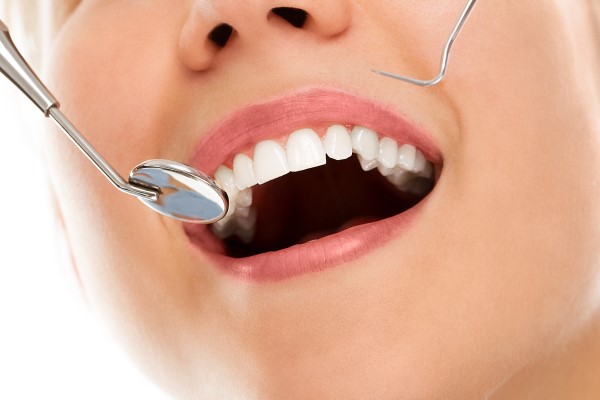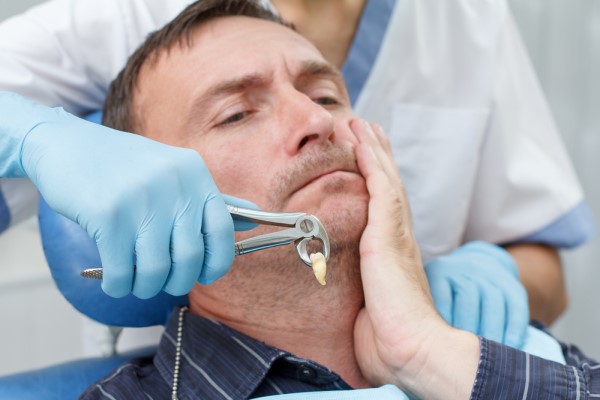Does Oral Surgery Hurt?

When a dentist recommends oral surgery, their patient may get nervous. This is the person’s natural reaction to the realization that they need to go through surgery. Along with the risks that accompany most surgical procedures, patients also worry about pain. With advances in both the medical and dental fields, is pain something a patient has to worry about as they await oral surgery?
What to expect from oral surgery
Oral surgery is any procedure that involves incisions, excisions or sutures that target the teeth, gums and other structures in the mouth. The dentist or oral surgeon performing an oral surgery prepares their patient by administering anesthetic and sometimes a sedative. Depending on the procedure, the patient may also receive medication to limit bleeding.
After the procedure, the dentist or oral surgeon sends the patient home when the anesthetic and/or a sedative wears off. However, there are oral surgeries that require a brief hospital stay.
Pain management during oral surgery: preparation
Minor procedures require a different pain management regimen compared to longer, more invasive surgeries. That said, there are aspects of pain management that are common to all types of oral surgery.
The first pain point in any dental procedure is the injection of an anesthetic; a dentist may numb the injection site with topical anesthetic. They will also minimize pain by using a needle of appropriate size, and with slow delivery of the numbing drug. Then there is the matter of sedation.
A patient who suffers anxiety in the dentist’s chair is a candidate for sedation dentistry. Depending on their procedure and anxiety level, the patient will receive one of the following forms of sedation:
- Oral sedation, an option for minor or moderately intensive procedures
- IV sedation
- General anesthesia
The level of sedation that a patient undergoes depends on the length and nature of their procedure. It also depends on the systemic health and anxiety level of the patient.
Pain during oral surgery
The effectiveness of the drugs that numb pain depends on the precision with which the anesthetic is administered. A skilled oral surgeon will do a precise job, taking into account the nerve anatomy, bone density and underlying medical conditions of the patient.
If need be, sedation complements anesthesia by depressing the patient’s consciousness or by putting the patient under. This means that the patient should feel no sensation at all for the duration of the procedure.
Aftercare, recovery and pain management
Anesthesia and sedation wear off in an hour (or two) after the end of the procedure. By this time, the patient should be on the pain management routine that their oral surgeon prescribes. This includes prescription or over-the-counter medication. It also includes at-home remedies like:
- The use of ice packs
- Elevating the head during sleep
- Rest
- Adoption of a soft food diet
- Modifying oral hygiene routines as per the oral surgeon’s instructions
- Avoidance of straws, sucking or any other action that creates negative pressure
The dentist or surgeon gives aftercare advice that is tailored to the type and size of their patient’s surgical site.
When to worry
The first 48 hours are the most uncomfortable, but at-home care will manage the pain. However, a patient who experiences constant, intense pain that does not subside with painkillers should seek medical help. The same goes for heavy bleeding that persists four hours after surgery.
Get the best possible care today
The thought of oral surgery can be scary, but a team of caring professionals goes a long way to ease the mind. Our practice has a team of dental professionals with years of experience in oral surgery. Get in touch with us and find out how we can walk with you on your journey to a healthy mouth.
Request an appointment here: https://voguedental.com or call Vogue Dental at (309) 449-8888 for an appointment in our Normal office.
Check out what others are saying about our dental services on Yelp: Oral Surgery in Normal, IL.
Recent Posts
When was your last dental checkup? Read on to learn more about the importance of regular dental care visits. A dental checkup visit with a dentist is a great way to detect the early signs of any oral health concerns and put together a restorative plan (if necessary) before the concerns worsen. Regular dental checkups…
Tooth extraction may become necessary due to damage or decay. The procedure involves removing a tooth entirely from its socket. To remove teeth, dentists use an elevator to loosen them and forceps to remove them entirely. In some cases, dentists may create incisions in the gums for better access. Following the removal, professionals clean and…
At its core, gum disease is an infection that will spread as far as it can, but only if you let it. For this reason, dentists and periodontists recommend prevention and early detection.The infection that is gum disease becomes more challenging to manage the longer that it goes untreated. This explains why severe gum disease…
If you are undergoing a teeth-straightening treatment like Invisalign®, you will likely have to visit your dentist often. Read on to learn about the importance of these visits. Many orthodontic patients believe that they do not need to see their dentist throughout their aligner treatment, but this is simply not true. These periodic dental appointments…


